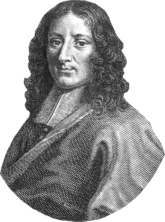Pierre Bayle
| Thinking hardly or hardly thinking? Philosophy |
| Major trains of thought |
| The good, the bad, and the brain fart |
| Come to think of it |
Pierre Bayle (18 November 1647 – 28 December 1706) was a French philosopher of the early Enlightenment. He is probably best known for his defense of universal toleration as an end in itself, in contrast to better-known liberals such as John Locke who believed that toleration was justified for theological reasons and should be restricted to Christian churches. Bayle is notorious for writing one thing and meaning another, a practice he picked up in France before he fled to the Netherlands. His Dictionnaire, for example, included seemingly quite mild articles on controversial topics, while he inserted radical arguments in innocuous places. He claimed to be a fideist aligned with orthodox Calvinism, and made the strident claim on this basis that religion is impossible to justify by reason. He took this argument through to its conclusion, saying that all religions must therefore be treated equally. He defended atheism, saying that "‘l'athéisme ne conduit pas nécessairement à la corruption des mœurs"—"atheism does not necessarily lead to a corruption of morals"—along with claiming that an atheist society could be well-regulated and that atheism was a far lesser evil than what he termed "superstition". All of these claims were radical propositions in his time, and he was ostracized as a "crypto-Spinozist". He lost his university chair and was condemned by an ecclesiastical council, and most of his original allies and friends disowned him after the radical implications of his thought became clear.
“”Plato and Epicurus I reject,
And turn more hopefully to learned Bayle. With even poised scale Bayle bids me doubt. He, wise and great enough to need no creed, Has slain all systems—combats even himself: Like that blind conqueror of Philistines, He sinks beneath the ruin he has wrought. |
| —Voltaire[1] |
Further reading[edit]
- Israel, J. I. (2006) Enlightenment Contested: Philosophy, Modernity, and the Emancipation of Man, 1670–1752. Chapters 6 and 11.
External links[edit]
References[edit]
- ↑ "Poem on the Lisbon Disaster", 1755.
